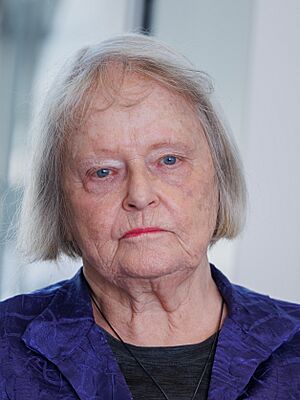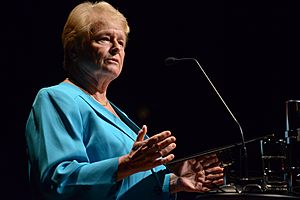Gro Harlem Brundtland facts for kids
Quick facts for kids
Gro Harlem Brundtland
|
|
|---|---|

Brundtland in 2025
|
|
| Prime Minister of Norway | |
| In office 3 November 1990 – 25 October 1996 |
|
| Monarch | Olav V Harald V |
| Preceded by | Jan P. Syse |
| Succeeded by | Thorbjørn Jagland |
| In office 9 May 1986 – 16 October 1989 |
|
| Monarch | Olav V |
| Preceded by | Kåre Willoch |
| Succeeded by | Jan P. Syse |
| In office 4 February 1981 – 14 October 1981 |
|
| Monarch | Olav V |
| Preceded by | Odvar Nordli |
| Succeeded by | Kåre Willoch |
| Director-General of the World Health Organization | |
| In office 13 May 1998 – 21 July 2003 |
|
| Secretary-General | Kofi Annan |
| Preceded by | Hiroshi Nakajima |
| Succeeded by | Lee Jong-wook |
| Leader of the Labour Party | |
| In office 1981–1992 |
|
| Preceded by | Reiulf Steen |
| Succeeded by | Thorbjørn Jagland |
| Minister of the Environment | |
| In office 6 September 1974 – 8 October 1979 |
|
| Prime Minister | Trygve Bratteli Odvar Nordli |
| Preceded by | Tor Halvorsen |
| Succeeded by | Rolf A. Hansen |
| Member of the Norwegian Parliament | |
| In office 1 October 1977 – 30 September 1997 |
|
| Deputy | Sissel Rønbeck Ivar Ødegaard Marit Nybakk Bjørn Tore Godal Rune E. Kristiansen |
| Constituency | Oslo |
| Personal details | |
| Born |
Gro Harlem
20 April 1939 Bærum, Akershus, Norway |
| Political party | Labour |
| Spouse |
Arne Olav Brundtland
(m. 1960; died 2024) |
| Children | 4, including Knut |
| Parents | Gudmund Harlem, Inga Margareta Elisabet Brynolf |
| Alma mater | University of Oslo (Cand.Med.) Harvard University (MPH) |
| Signature | |
Gro Brundtland (born Gro Harlem, 20 April 1939) is a famous Norwegian politician. She was the prime minister of Norway three times. She also led the Labour Party and was the head of the World Health Organization (WHO).
Gro Brundtland is also well-known for leading the Brundtland Commission. This group wrote an important report called Our Common Future. It introduced the idea of sustainable development, which means meeting our needs today without harming the ability of future generations to meet their own needs.
She trained as a doctor before entering politics. In 1974, she became the Minister of the Environment. On 4 February 1981, she made history as Norway's first female prime minister. She served again from 1986 to 1989 and from 1990 to 1996.
After leaving her role as prime minister in 1996, she became a global leader. She worked on sustainable development and public health. She was the director-general of the World Health Organization from 1998 to 2003. From 2007 to 2010, she was a special envoy for the United Nations on Climate Change. She is also a deputy chair of The Elders, a group of world leaders working for peace.
Many people called Gro Brundtland the "mother of the nation" because of her leadership. She received the Charlemagne Prize in 1994 and many other awards.
Contents
Early Life and Education
Gro Brundtland was born in Oslo, Norway, in 1939. Her father, Gudmund Harlem, was also a doctor and politician. Her mother was Inga Margareta Elisabet Brynolf. Gro has a younger brother, Lars, and a younger sister, Hanne.
In 1963, she earned her medical degree from the University of Oslo. She continued her studies at Harvard University in the United States. In 1965, she received a master's degree in Public Health.
From 1966 to 1969, Gro worked as a doctor at the Norwegian Directorate of Health. After that, she worked as a doctor in Oslo's public school health service starting in 1969.
Political Career in Norway
Gro Brundtland began her political journey as the Minister for Environmental Affairs. She held this position from 1974 to 1979.
Becoming Prime Minister
In 1981, Gro Brundtland became Norway's first female prime minister. She served in this role from February to October of that year.
She later served two more times as prime minister. Her second term was from 9 May 1986 to 16 October 1989. This government was famous worldwide because nearly half of its ministers were women. Eight out of eighteen ministers were female. Her third term as prime minister lasted from 3 November 1990 to 25 October 1996.
Gro Brundtland became the leader of the Labour Party in 1981. She remained the party leader until 1992, while she was still prime minister. In 1996, she stepped down from her role as prime minister and retired from national politics. Thorbjørn Jagland took over as both the Labour Party leader and prime minister after her.
Local Government Work
Gro Brundtland returned to politics at a local level. She ran for a seat on the Oslo City Council in the 2023 local elections. She successfully won a seat on the council.
Global Leadership Roles
In 1983, the United Nations Secretary-General, Javier Pérez de Cuéllar, asked Gro Brundtland to lead a special group. This group was called the World Commission on Environment and Development (WCED), also known as the Brundtland Commission.
She helped create the idea of sustainable development. The commission held many public meetings and listened to many different voices. In April 1987, the commission published its report, Our Common Future. This report helped lead to the 1992 Earth Summit, a major international meeting about the environment.
During her third term as prime minister, Norway played a key role in peace talks. In 1993, the Norwegian government helped arrange secret peace discussions between Israel and the PLO. These talks led to the signing of the Oslo Accords.
Leading the World Health Organization
After her time as prime minister, Gro Brundtland was chosen to be the Director-General of the World Health Organization (WHO) in May 1998. In this important role, she focused on many areas of public health. She created a commission to study how economics affects health. She also worked to address violence as a major health issue.
Brundtland led a global effort to reduce cigarette smoking. She promoted education, persuasion, and higher taxes on tobacco. Under her leadership, the WHO was one of the first major organizations to make quitting smoking a condition for employment.
In 2003, Scientific American magazine named her their 'Policy Leader of the Year'. This was for her quick global response to stop outbreaks of SARS. She left the WHO on 21 July 2003.
Other International Work
In 2007, the UN Secretary-General, Ban Ki-moon, appointed Gro Brundtland as a UN Special Envoy for Climate Change. She worked alongside other former leaders to address global climate issues.
Gro Brundtland is a founding member of The Elders. This group of world leaders was brought together by Nelson Mandela. Their goal is to work on some of the world's most difficult problems. She has traveled with The Elders to many places, including Cyprus, the Korean Peninsula, and the Middle East. She has also been involved in their work to end child marriage. She became the Deputy Chair of The Elders in 2013.
Personal Life
Gro Harlem married Arne Olav Brundtland on 9 December 1960. They have four children, though one has passed away. They also own a house in the south of France.
Health Information
In 2002, Gro Brundtland had surgery for uterine cancer at Oslo University Hospital, Ullevål. In 2008, it became known that she had received medical treatments in Norway. She later decided to pay for these treatments herself.
Awards and Recognitions
Gro Brundtland has received many awards and honors for her work, including:
- Indira Gandhi Prize (1988)
- Charlemagne Prize (1994)
- Member of the American Philosophical Society (2002)
- Thomas Jefferson Foundation Medal in Architecture (2008)
- Prize International Catalonia (2013) with Malala Yousafzai
- Tang Prize in Sustainable Development (2014)
- Honorary member of the Norwegian Association for Women's Rights (2016)
- Member of the Norwegian Academy of Science and Letters
- The National German Sustainability Award
- Honorary Member of the Moscow Society of Naturalists
Images for kids
See also
 In Spanish: Gro Harlem Brundtland para niños
In Spanish: Gro Harlem Brundtland para niños
 | Laphonza Butler |
 | Daisy Bates |
 | Elizabeth Piper Ensley |


